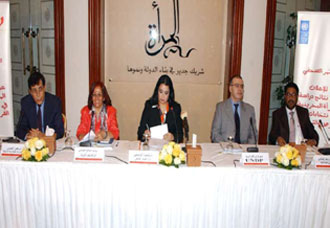
|
 |
 |
|
|
|
|
|
|
|
|
|
|
|
|
|
|
|
|
|
|
|
|
|
|
Next Elections: Women Doomed to Failure
|
 |
The study observed that women were not nominated by the main political societies during the 2006 elections which lowered their chances of winning. There are unofficial promises from the Al Wifaq Society that two women will be on their candidates list, and if this happens, it is most likely that they will win.
According to the same study, most female candidates in the previous parliamentary elections were not associated with any political society. There were 21 female nominees in the previous elections, 19 of which ran independently (90.5%), while only two ran as part of political societies (9.5%). With regards to the candidates’ level of education, the study revealed that ‘all had received a suitable amount of education. The percentage of female candidates with post graduates degrees was 47.6%, and those with university degrees was 28.4% and only 23.8% were at GCSE level’
The study pointed to a number of obstacles facing female candidates, including ‘their inability to build alliances, the lack of financial support, the lack of an affordable specialized administrative team and technical expertise’. Other obstacles include the tension in the political atmosphere and the media and newspapers’ lack of cooperation as they demanded a great amount of money for covering women’s elections activities.
The study also shows that 28.8% of the candidates felt that the reason for their failure in the elections was ‘due to the attitude of religious leaders who have spiritual and social influence.’ These leaders believe that the nomination of women for the legislative council is not permissible. The study also showed that 19% of female candidates attribute their failure to the influence of political societies and other problems associated with elections. On the other hand, 9.6% believe that mismanagement of the campaign was the problem, and 4.8% thought that weak funding was behind their failure.
In order to help women in the next elections, the study recommends that the Government put forward regulations that would organize the campaign and would guarantee equal opportunities and limit the financial obstacles facing women in the elections. The study also recommends the introduction of a media policy based on principles that are accepted by all media and information institutions. This is in order to unify the coverage of the elections, limit the candidates’ financial influence in the media and reinforce its independence. The media should also contribute in changing the perception of female candidates in society.